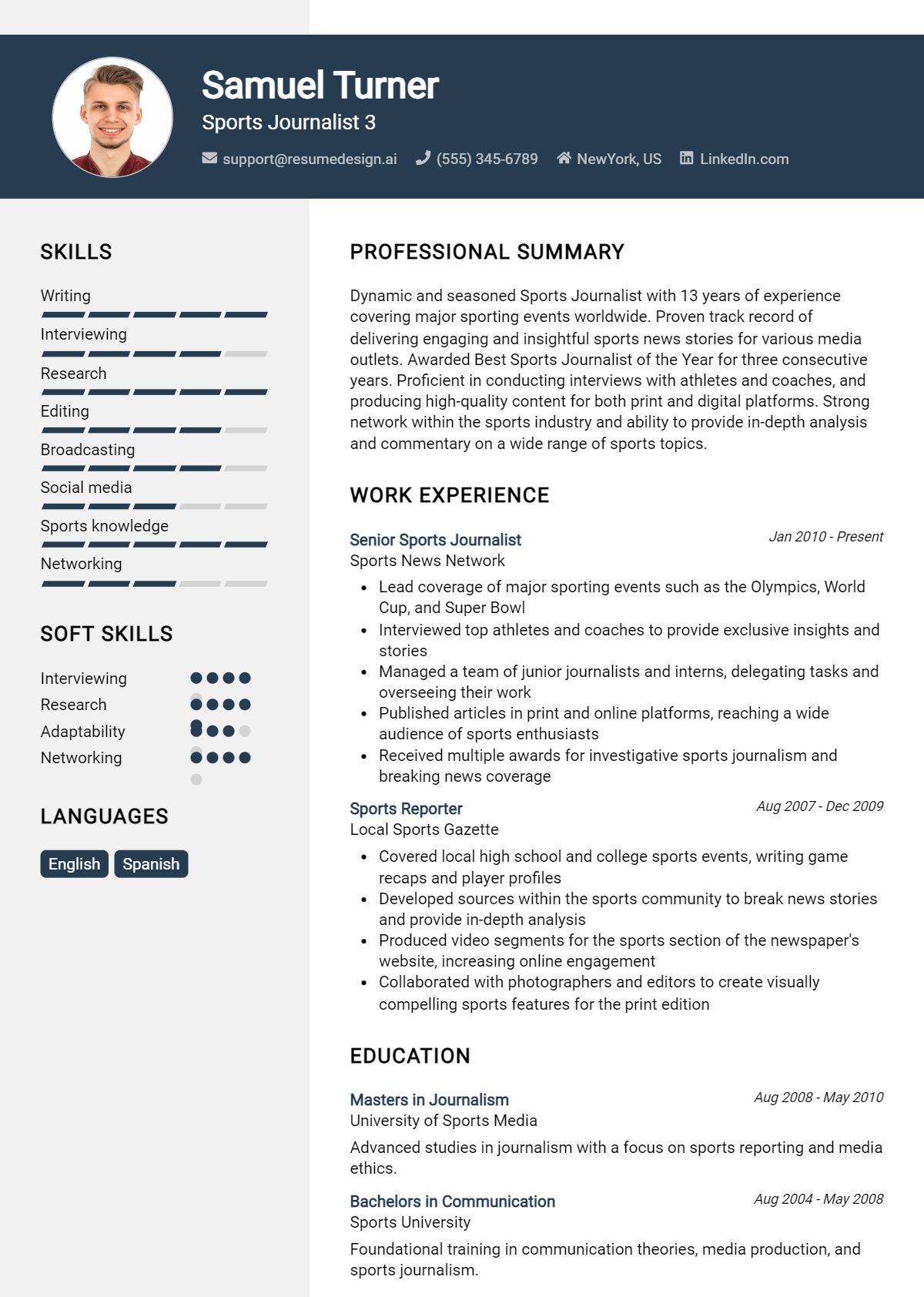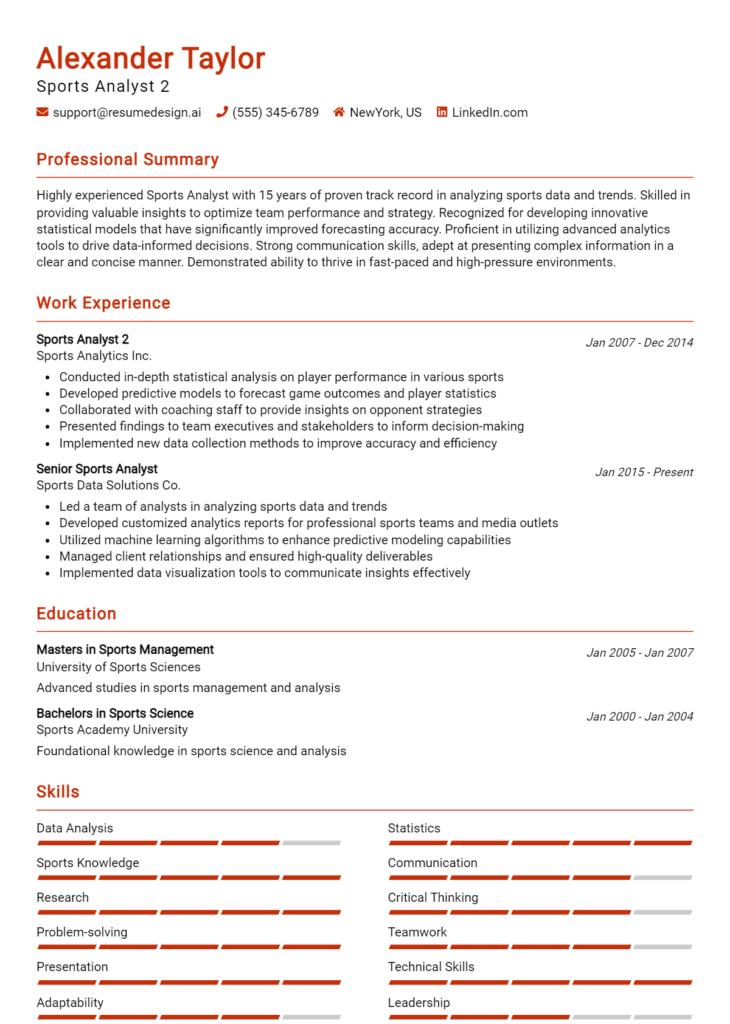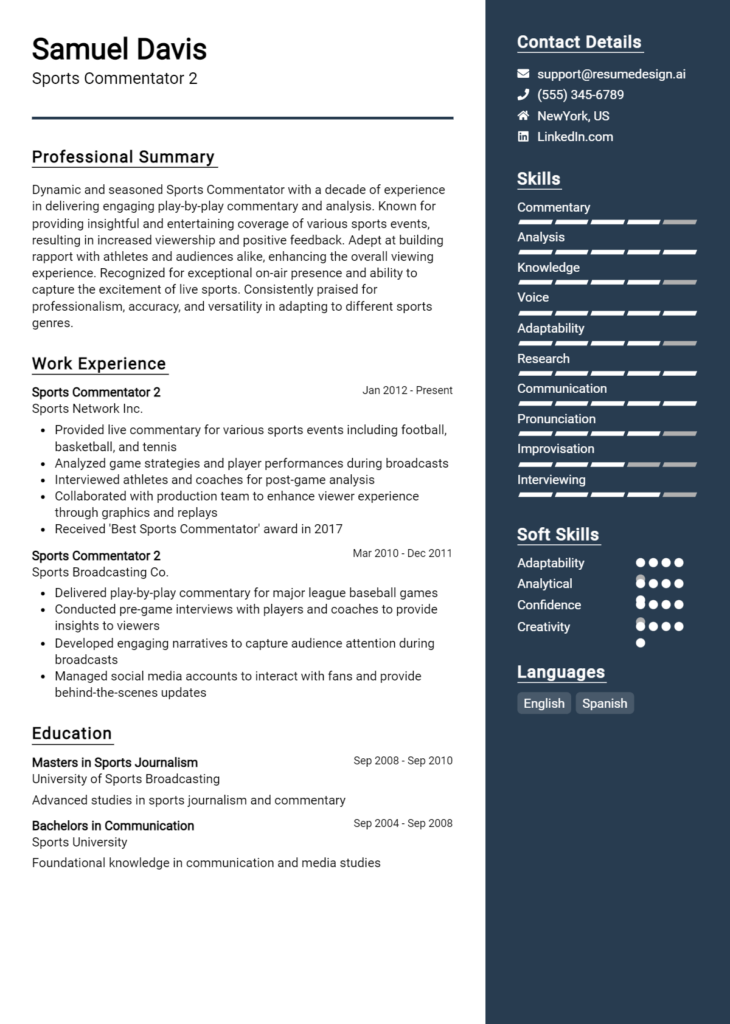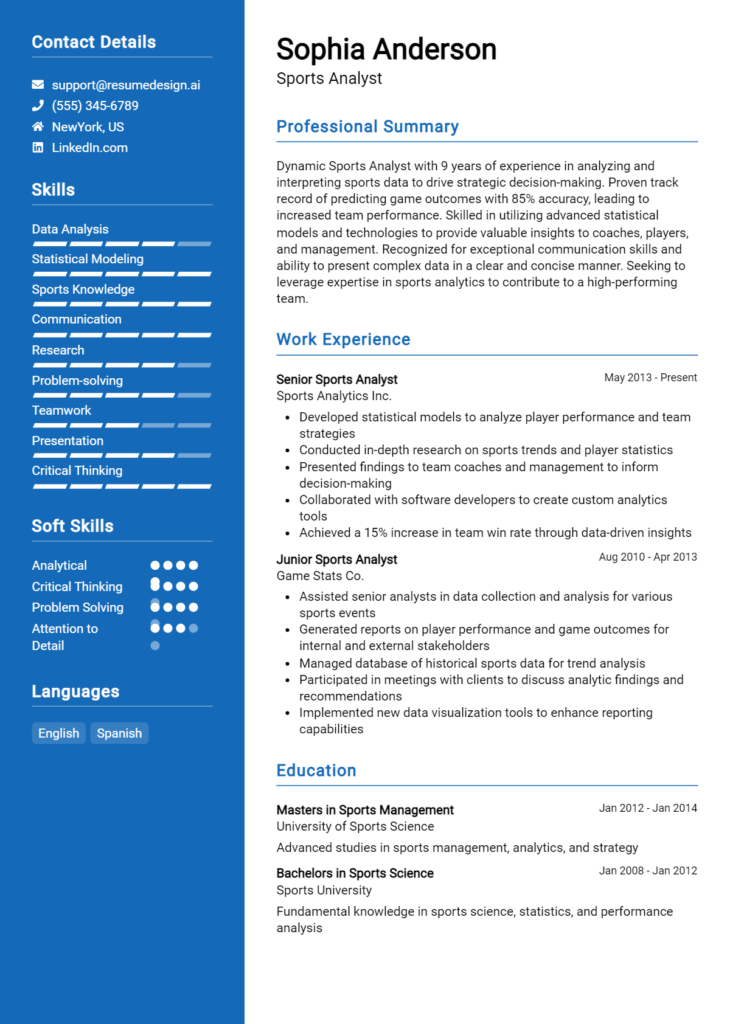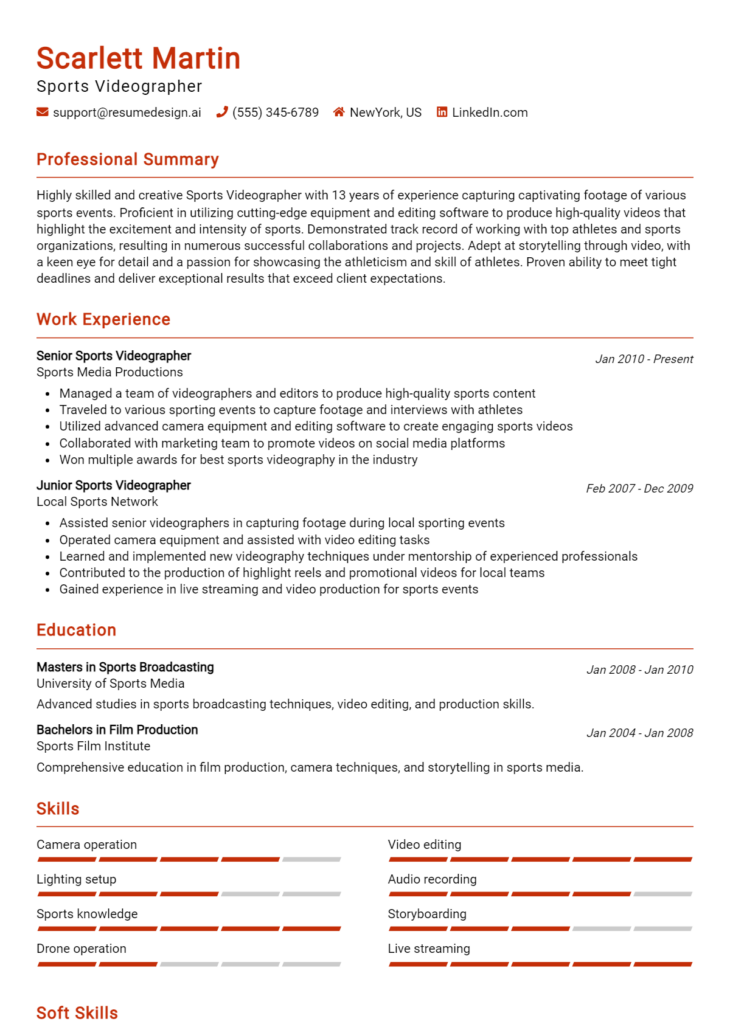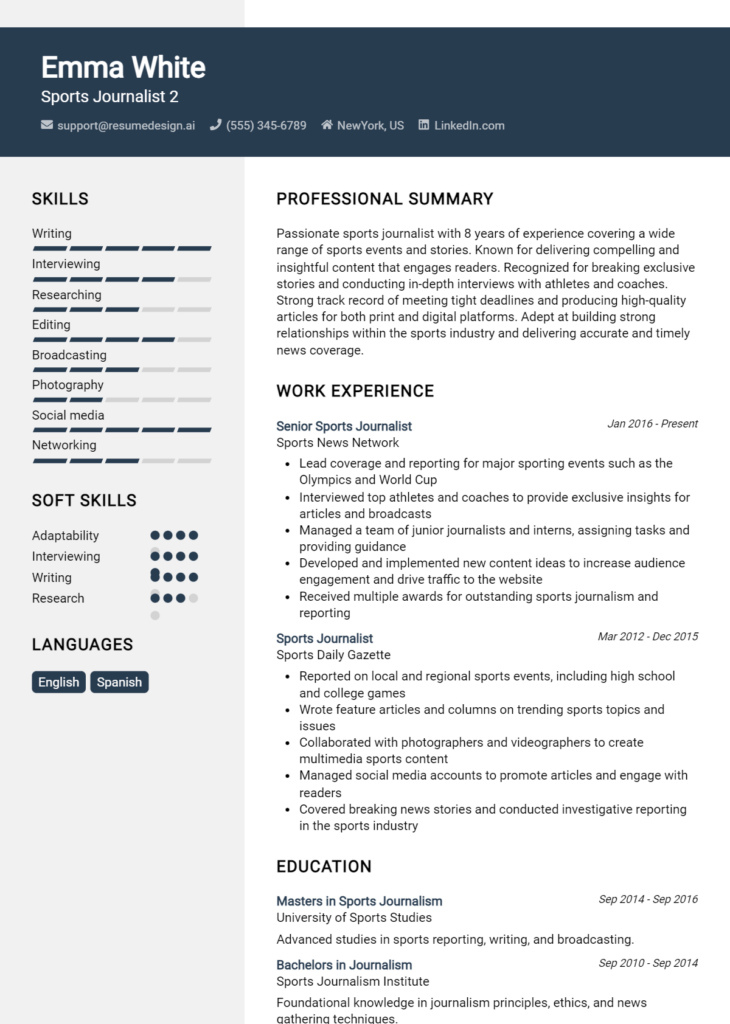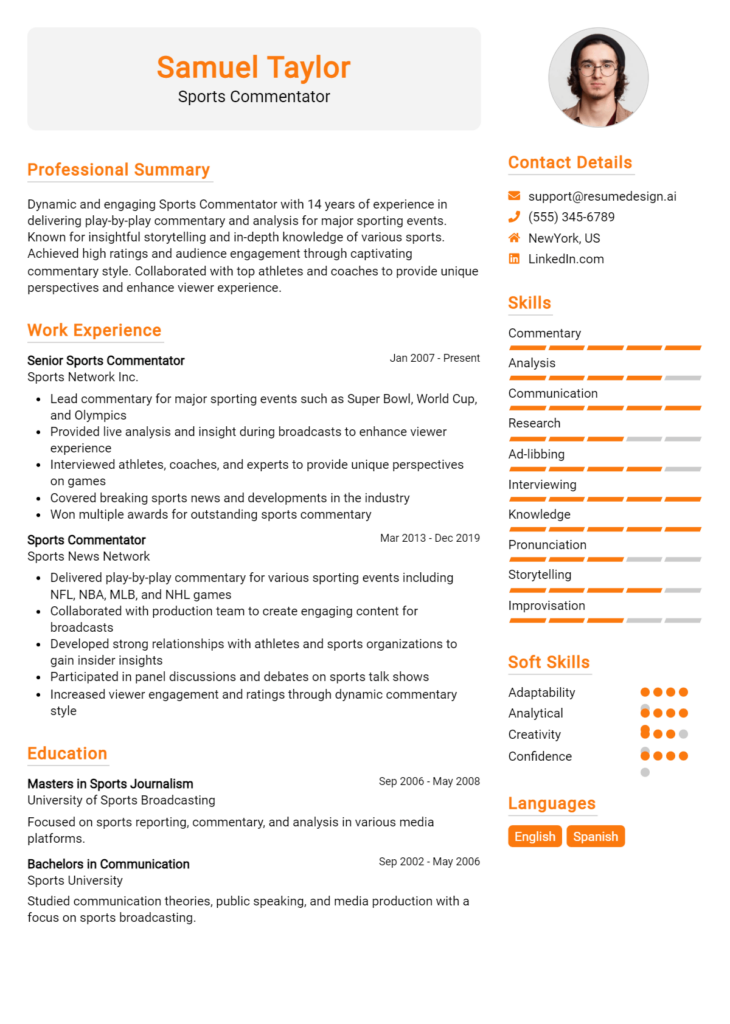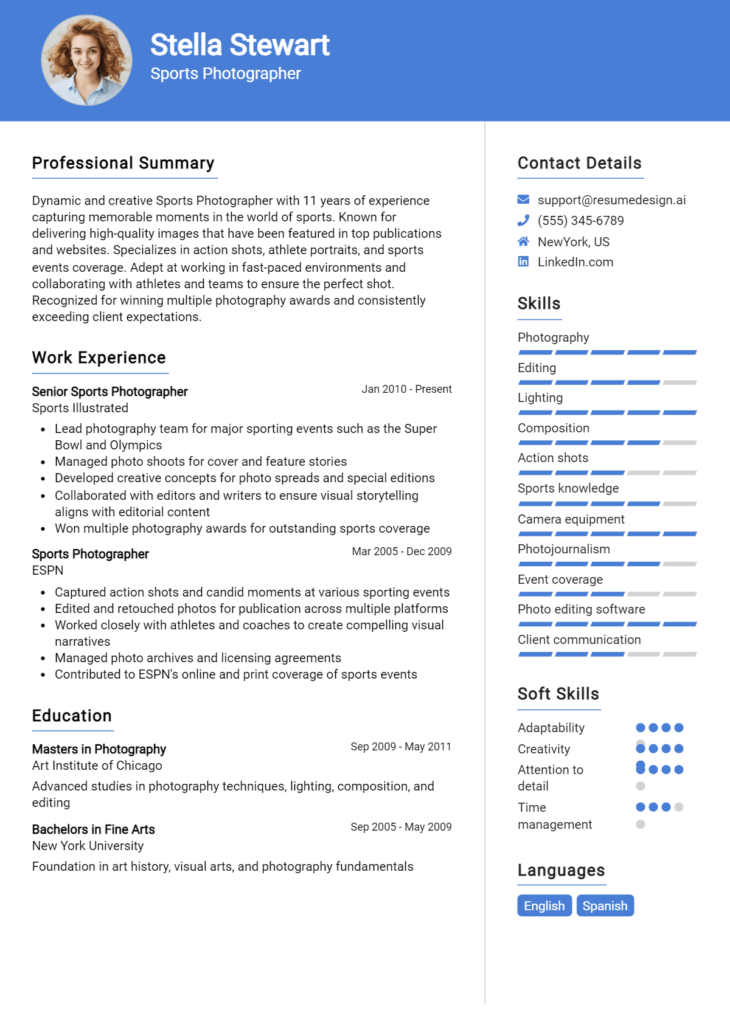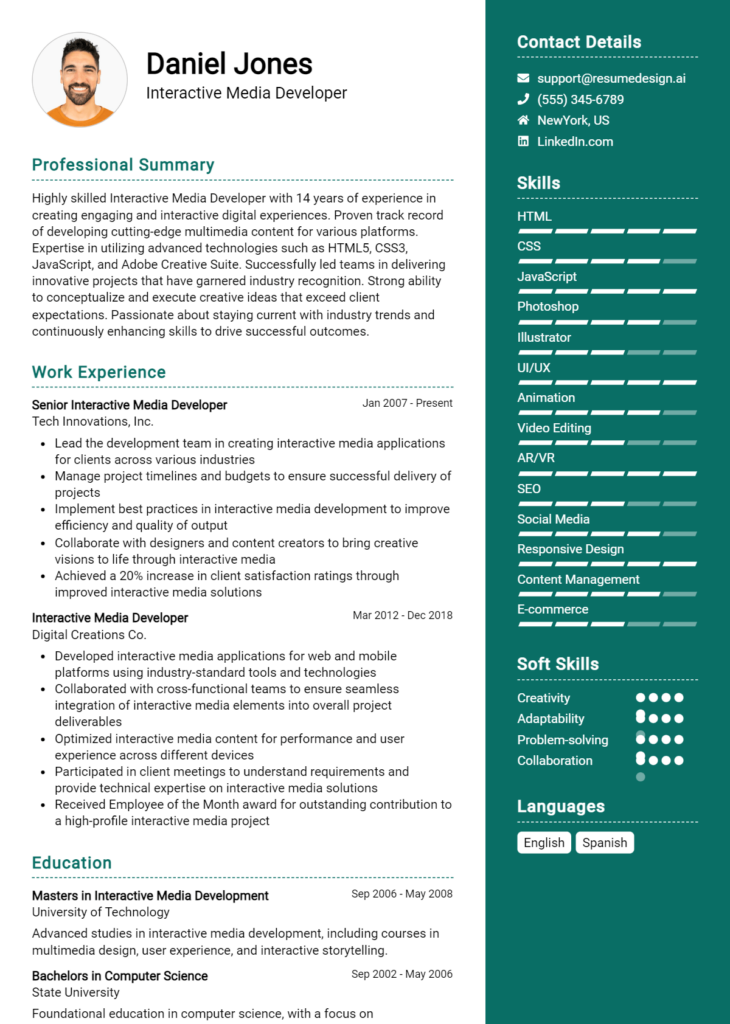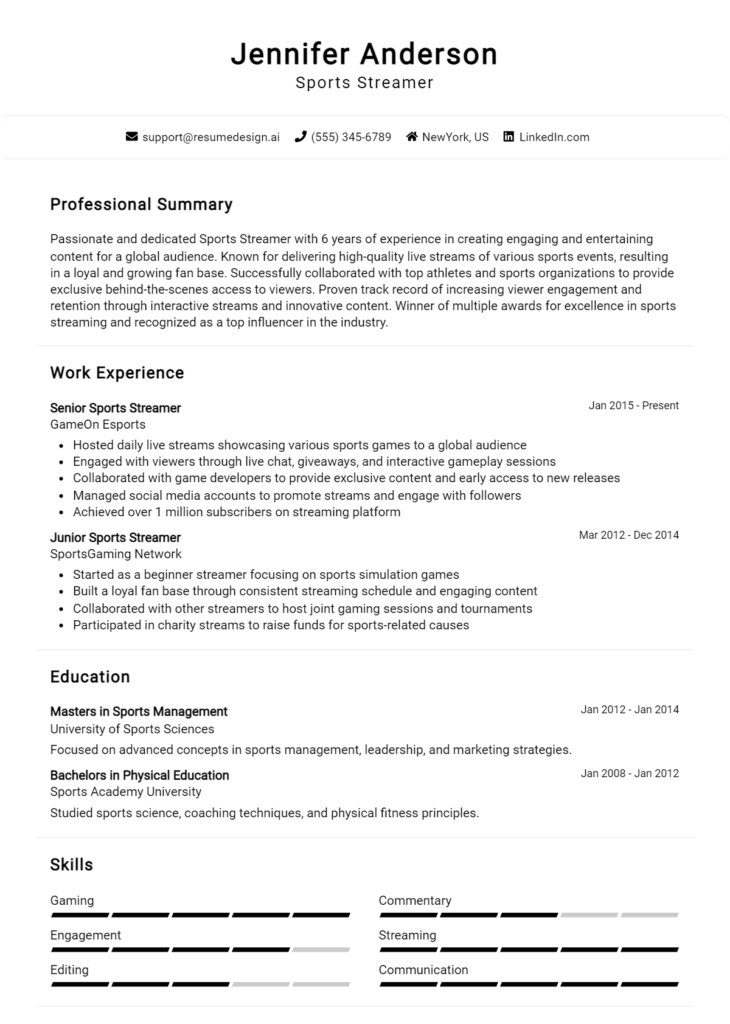Sports Journalist Core Responsibilities
A Sports Journalist plays a vital role in the sports industry, combining technical expertise with strong operational and problem-solving skills. They are responsible for researching, reporting, and writing engaging content, which connects various departments such as marketing, public relations, and broadcasting. Their ability to analyze data and trends enhances storytelling, contributing to the organization’s goals. A well-structured resume that highlights these competencies can significantly boost a candidate's chances of success in this competitive field.
Common Responsibilities Listed on Sports Journalist Resume
- Conducting interviews with athletes, coaches, and sports figures.
- Researching and analyzing sports statistics and trends.
- Writing articles, blogs, and reports for various media outlets.
- Covering live events, including games and press conferences.
- Creating multimedia content, including videos and podcasts.
- Developing story ideas and pitching to editors.
- Maintaining strong relationships with sources and industry professionals.
- Adhering to deadlines and managing multiple assignments.
- Utilizing social media platforms for audience engagement.
- Fact-checking information to ensure accuracy and credibility.
- Collaborating with photographers and graphic designers.
- Staying updated on sports news and developments.
High-Level Resume Tips for Sports Journalist Professionals
In the competitive field of sports journalism, a well-crafted resume is not just a formality; it is the critical first impression that candidates make on potential employers. A resume serves as a powerful marketing tool that should effectively highlight both skills and achievements relevant to the sports industry. Given the dynamic nature of this field, it's essential for sports journalists to present their unique experiences and qualifications in a way that resonates with hiring managers. This guide will provide practical and actionable resume tips specifically tailored for sports journalist professionals, ensuring that your resume stands out in the crowded job market.
Top Resume Tips for Sports Journalist Professionals
- Tailor your resume to each job description by using keywords and phrases that match the specific role you are applying for.
- Showcase relevant experience by including internships, freelance work, or any contributions to sports publications.
- Quantify your achievements with metrics, such as the number of articles published, audience reach, or engagement stats on social media platforms.
- Highlight industry-specific skills such as knowledge of different sports, interviewing techniques, and proficiency in multimedia journalism.
- Include a strong summary statement that captures your passion for sports journalism and your career aspirations.
- Utilize a clean and professional format that makes your resume easy to read and visually appealing.
- Incorporate links to your portfolio or samples of your work, including articles, podcasts, or videos, to showcase your versatility.
- Employ action verbs to describe your responsibilities and achievements, making your contributions stand out.
- Stay concise and focused; aim for a one-page resume that highlights the most relevant information without unnecessary fluff.
By implementing these tips, sports journalism professionals can significantly enhance their resumes, making them more appealing to potential employers. A well-structured and thoughtful resume can be the difference between landing an interview or getting lost in the shuffle, ultimately increasing the chances of securing a coveted position in the exciting world of sports journalism.
Why Resume Headlines & Titles are Important for Sports Journalist
In the competitive field of sports journalism, a well-crafted resume headline or title serves as the first impression a candidate makes on hiring managers. A strong headline can immediately grab attention and encapsulate a candidate's key qualifications in a single impactful phrase. This critical element should be concise, relevant, and tailored to the specific job being applied for, ensuring that it effectively communicates the candidate's unique strengths and abilities in the realm of sports reporting, writing, and analysis.
Best Practices for Crafting Resume Headlines for Sports Journalist
- Keep it concise: Aim for one impactful phrase that highlights your core qualifications.
- Make it role-specific: Tailor the headline to reflect the specific position you are applying for.
- Use strong adjectives: Incorporate powerful words that convey expertise and enthusiasm.
- Highlight key skills: Focus on the most relevant skills that align with the job description.
- Include measurable accomplishments: If possible, hint at achievements that demonstrate your success in the field.
- Stay professional: Ensure the tone matches the expectations of the industry while remaining personable.
- Avoid clichés: Steer clear of overused phrases that may dilute your uniqueness.
- Test for impact: Ask peers for feedback to determine if the headline resonates and captures attention.
Example Resume Headlines for Sports Journalist
Strong Resume Headlines
"Award-Winning Sports Journalist with 5+ Years Covering Major League Events"
“Dynamic Sports Writer Specializing in In-Depth Analysis and Commentary”
“Experienced Sports Journalist with Proven Track Record in Digital Media and Reporting”
Weak Resume Headlines
“Sports Journalist Looking for Work”
“Experienced Writer”
The strong headlines are effective because they clearly communicate the candidate’s strengths, experience, and specific skills relevant to sports journalism, making a powerful first impression. In contrast, the weak headlines fail to impress due to their vagueness and lack of specificity, leaving hiring managers uncertain about the candidate’s qualifications and reducing the likelihood of further consideration.
Writing an Exceptional Sports Journalist Resume Summary
A well-crafted resume summary is crucial for a Sports Journalist, as it serves as the first impression on hiring managers who may be sifting through numerous applications. A strong summary effectively captures attention by succinctly showcasing key skills, relevant experience, and noteworthy accomplishments that align with the job role. By being concise yet impactful, this section of the resume not only highlights the candidate’s qualifications but also demonstrates their understanding of the specific needs of the position they are applying for, ultimately increasing their chances of being invited for an interview.
Best Practices for Writing a Sports Journalist Resume Summary
- Quantify achievements to demonstrate impact (e.g., "increased readership by 30%").
- Focus on relevant skills such as writing, interviewing, and research.
- Tailor the summary to match the job description and specific requirements.
- Highlight key accomplishments that showcase expertise in sports journalism.
- Use strong action verbs to convey a sense of proactivity and effectiveness.
- Keep it concise, ideally between 2-4 sentences, to maintain readability.
- Incorporate industry-specific terminology to exhibit familiarity with the field.
- Avoid jargon or overly complex language that may detract from clarity.
Example Sports Journalist Resume Summaries
Strong Resume Summaries
Dynamic Sports Journalist with over 5 years of experience covering major league sports. Increased online engagement by 40% through compelling storytelling and strategic use of social media platforms.
Award-winning journalist with a proven track record of delivering in-depth analysis and breaking news on high-stakes events. Successfully secured exclusive interviews with top athletes, enhancing publication credibility and readership.
Dedicated Sports Writer skilled in multimedia reporting and audience engagement. Authored over 150 articles with an average of 25,000 unique views per piece, demonstrating expertise in audience-driven content creation.
Weak Resume Summaries
I am a sports journalist looking for a position where I can write about sports.
Experienced in writing articles and covering games. I have a passion for sports and enjoy reporting.
The strong resume summaries are considered effective because they provide quantifiable results, specific skills, and direct relevance to the role of a Sports Journalist. They highlight measurable achievements and demonstrate the candidate’s understanding of the industry. In contrast, the weak summaries are vague and lack concrete outcomes, making them less compelling and memorable to hiring managers. They do not showcase the candidate’s qualifications or unique contributions to the field, resulting in a missed opportunity to stand out.
Work Experience Section for Sports Journalist Resume
The work experience section of a Sports Journalist resume is crucial as it serves as the cornerstone of the candidate's qualifications and professional journey. This section not only highlights the technical skills and expertise that the journalist possesses but also showcases their ability to manage teams and deliver high-quality content under tight deadlines. By quantifying achievements and aligning work experiences with industry standards, candidates can effectively demonstrate their contributions to previous employers and their readiness for future roles. A well-crafted work experience section can significantly influence hiring decisions, making it essential for candidates to present their backgrounds in a compelling and precise manner.
Best Practices for Sports Journalist Work Experience
- Highlight technical expertise by detailing specific tools and technologies used in reporting, editing, and publishing.
- Quantify achievements with metrics such as audience growth, engagement rates, or successful project completions.
- Include examples of collaboration with other journalists, editors, and multimedia teams to produce cohesive content.
- Tailor experiences to align with industry standards and showcase relevance to the job description.
- Use action verbs to convey a sense of initiative and impact in previous roles.
- Demonstrate leadership through team management, mentorship, or project oversight.
- Incorporate feedback or recognition received from peers, supervisors, or industry awards.
- Keep descriptions concise but impactful to maintain the reader's attention.
Example Work Experiences for Sports Journalist
Strong Experiences
- Led a team of five journalists in covering the 2022 Summer Olympics, resulting in a 30% increase in website traffic during the event.
- Produced a weekly sports podcast that achieved over 10,000 downloads per episode, significantly boosting audience engagement.
- Developed an investigative piece on youth sports injuries that was published in a leading sports magazine, earning a national award for excellence in journalism.
- Collaborated with data analysts to create interactive graphics that enhanced storytelling and were featured in multiple online articles, increasing reader retention by 25%.
Weak Experiences
- Worked as a reporter for a local newspaper covering various sports events.
- Assisted in writing articles and conducting interviews.
- Involved in team meetings to discuss story ideas.
- Helped with the editing process of sports-related content.
The examples provided illustrate the stark contrast between strong and weak work experiences. Strong experiences are characterized by specific, quantifiable outcomes and demonstrate leadership and collaboration, showcasing the candidate's ability to make a significant impact in their role. In contrast, weak experiences lack detail and measurable results, failing to convey the candidate's contributions or technical skills effectively. By focusing on achievements and the ability to work within a team, candidates can create a compelling narrative that enhances their potential for hiring.
Education and Certifications Section for Sports Journalist Resume
The education and certifications section of a Sports Journalist resume plays a pivotal role in demonstrating a candidate's academic background and commitment to the field. This section not only showcases relevant degrees and coursework but also highlights any industry-recognized certifications and specialized training that can set a candidate apart. By providing clear evidence of continuous learning efforts and professional development, this section enhances the candidate's credibility and alignment with the demands of the sports journalism industry, making them a more attractive prospect for potential employers.
Best Practices for Sports Journalist Education and Certifications
- Focus on relevant educational qualifications, such as degrees in journalism, communications, or sports management.
- Include industry-recognized certifications, such as those from the Associated Press or National Association of Sports Writers and Broadcasters.
- Provide specific coursework that directly relates to sports journalism, such as Sports Reporting, Media Ethics, and Digital Journalism.
- Highlight any internships or hands-on experiences that demonstrate practical application of skills learned through education.
- Keep the section concise and easy to read, avoiding unnecessary details that do not relate to the sports journalism field.
- Use bullet points for clarity, making it easier for hiring managers to scan your qualifications quickly.
- Include dates of attendance and graduation to show recent educational endeavors.
- Regularly update this section to reflect any new certifications or courses taken to stay current in the industry.
Example Education and Certifications for Sports Journalist
Strong Examples
- Bachelor of Arts in Journalism, University of Sports Media, 2021
- Certification in Sports Communication, National Sports Journalism Association, 2022
- Relevant Coursework: Sports Reporting, Advanced Multimedia Journalism, and Ethics in Sports Media
- Internship: Sports Reporting Intern at Daily Sports News, Summer 2020
Weak Examples
- Bachelor of Arts in History, University of Somewhere, 2018
- Certification in General Photography, Online Course Provider, 2019
- Relevant Coursework: Introduction to Philosophy
- High School Diploma, Local High School, 2015
The strong examples are considered effective because they directly relate to the qualifications and skills necessary for a sports journalist, showcasing relevant education, certifications, and applicable coursework. In contrast, the weak examples lack relevance to the field of sports journalism, featuring unrelated degrees and certifications that do not enhance the candidate's suitability for the role. This stark contrast emphasizes the importance of tailoring educational qualifications to the specific demands of the desired position.
Top Skills & Keywords for Sports Journalist Resume
In the competitive field of sports journalism, having a well-crafted resume that highlights your skills is crucial for standing out to potential employers. A strong blend of both hard and soft skills not only showcases your technical abilities but also demonstrates your capacity for effective communication, critical thinking, and adaptability in a fast-paced environment. As you construct your resume, focus on presenting these skills clearly and concisely, as they provide a snapshot of your qualifications and potential contributions to a media organization. For more information on how to effectively showcase your skills and work experience, consider exploring additional resources.
Top Hard & Soft Skills for Sports Journalist
Soft Skills
- Strong communication skills
- Critical thinking
- Adaptability
- Team collaboration
- Time management
- Creativity
- Networking abilities
- Attention to detail
- Problem-solving skills
- Emotional intelligence
- Persuasiveness
- Conflict resolution
- Cultural awareness
- Resilience
- Interpersonal skills
Hard Skills
- Knowledge of AP Style and journalistic standards
- Proficiency in multimedia storytelling
- Research and investigative skills
- Data analysis and interpretation
- Social media management
- SEO (Search Engine Optimization) techniques
- Video and audio editing skills
- Familiarity with sports analytics tools
- Photography skills
- Writing and editing proficiency
- Knowledge of various sports rules and regulations
- Experience with content management systems (CMS)
- Ability to conduct interviews
- Proficiency in using statistical software
- Understanding of broadcasting techniques
- Knowledge of digital marketing strategies
- Familiarity with HTML/CSS for online publishing
By emphasizing these essential skills on your resume, you can effectively demonstrate your qualifications and increase your chances of landing a position in the exciting world of sports journalism.
Stand Out with a Winning Sports Journalist Cover Letter
Dear [Hiring Manager's Name],
I am writing to express my enthusiasm for the Sports Journalist position at [Company Name], as advertised on [Job Board/Website]. With a solid background in sports reporting and a deep passion for athletics, I am excited about the opportunity to contribute to your team. My experiences at [Previous Company/Internship] have equipped me with the skills to craft compelling narratives that not only inform but also engage readers, making them feel the thrill of the game from the sidelines.
During my time at [Previous Company], I covered a variety of sporting events, including professional football, basketball, and local high school competitions. My ability to adapt quickly to fast-paced environments allowed me to effectively report on live events, ensuring that my articles were accurate, timely, and captivating. I take pride in my research skills, which enable me to provide insightful commentary and analysis. Whether it's analyzing player statistics or interviewing athletes and coaches, I strive to deliver a well-rounded perspective that resonates with fans and informs casual readers alike.
Moreover, my proficiency in digital media has allowed me to expand my storytelling capabilities beyond traditional print. I am adept at using social media platforms to promote my work, engage with audiences, and create multimedia content that enhances the reader's experience. I believe that a successful sports journalist must not only report the facts but also create a connection with the audience, and I am committed to doing just that. I am excited about the potential to bring my unique voice and perspective to [Company Name] and contribute to your legacy of outstanding sports journalism.
Thank you for considering my application. I look forward to the opportunity to discuss how my background, skills, and enthusiasm for sports can align with the goals of your team. I am eager to bring my passion for storytelling and in-depth sports knowledge to [Company Name].
Sincerely,
[Your Name]
[Your Contact Information]
[LinkedIn Profile or Portfolio URL]
Common Mistakes to Avoid in a Sports Journalist Resume
When crafting a resume as a sports journalist, it's essential to present a polished and professional image that effectively showcases your skills and experience. However, many applicants fall into common pitfalls that can hinder their chances of landing an interview. Avoiding these mistakes can make a significant difference in how your resume is perceived by hiring managers. Here are some of the most frequent errors to steer clear of:
Generic Objective Statement: Using a vague or generic objective fails to capture your specific aspirations or align with the job. Tailor your objective to reflect your passion for sports journalism and the particular position.
Lack of Relevant Experience: Including unrelated jobs or experiences may dilute your resume. Focus on highlighting journalism roles, internships, or volunteer work that directly relates to sports reporting.
Overly Complex Language: Using jargon or overly complex language can alienate readers. Aim for clarity and conciseness, ensuring that your writing is accessible and engaging.
Ignoring Formatting Consistency: Inconsistent formatting, such as varying font sizes or styles, can make your resume look unprofessional. Stick to a clean, uniform format throughout to enhance readability.
Neglecting Quantifiable Achievements: Failing to include specific accomplishments can make your experience seem less impactful. Incorporate metrics or examples that demonstrate your contributions, such as increased readership or successful event coverage.
Omitting Online Portfolio Links: Not including links to your published work or online portfolio can be a missed opportunity. Showcase your writing skills and previous work by providing accessible links.
Typos and Grammatical Errors: Simple mistakes can undermine your credibility as a journalist. Always proofread your resume multiple times and consider having a colleague review it.
Excessive Length: A resume that is too long can overwhelm hiring managers. Aim for a concise, one-page format that highlights the most relevant and impressive aspects of your career.
Conclusion
In the fast-paced world of sports journalism, having a standout resume is crucial for landing your dream job. Throughout this article, we've explored the essential skills and experiences that make a successful sports journalist, including strong writing abilities, a deep understanding of various sports, and the capacity to work under tight deadlines. We also discussed the importance of networking and gaining practical experience through internships or freelance opportunities to bolster your portfolio.
Now is the perfect time to take stock of your resume and ensure it reflects your unique journey and qualifications in the sports journalism field. Don't miss the opportunity to make a lasting impression on potential employers.
To assist you in this endeavor, we recommend utilizing various tools designed to enhance your resume. Explore our resume templates for professionally designed layouts, use our resume builder to create a tailored document that showcases your skills, and check out our resume examples for inspiration. Additionally, consider crafting a compelling cover letter using our cover letter templates to further elevate your application.
Take action today—review your sports journalist resume and leverage these resources to stand out in a competitive field!

